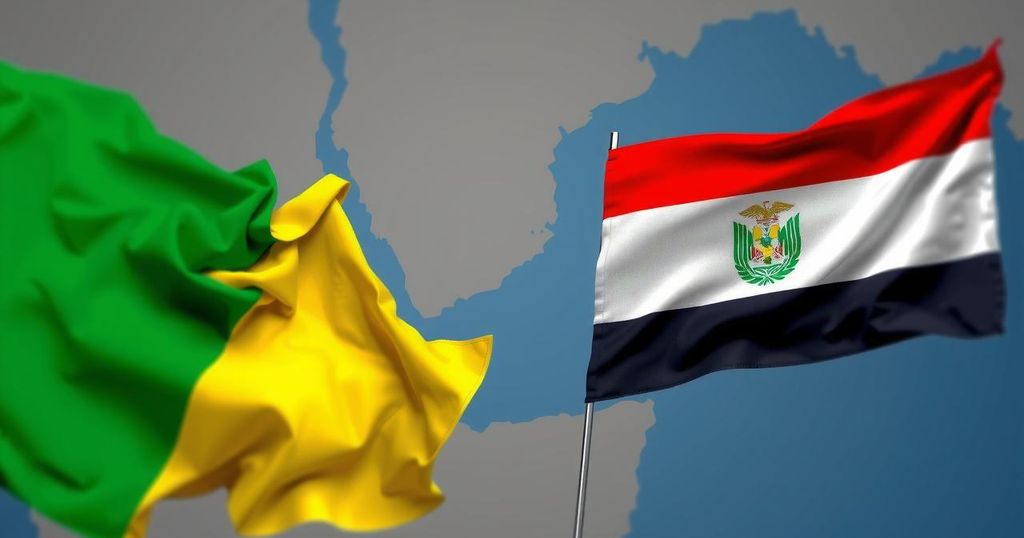The trilateral summit in Asmara between Egypt, Eritrea, and Somalia reflects Cairo’s strategic response to counter Ethiopia’s growing influence in the Horn of Africa, particularly concerning the Grand Ethiopian Renaissance Dam (GERD) and the recent activation of the Entebbe Agreement. This meeting highlights Egypt’s renewed commitment to strengthen military alliances in the region amidst ongoing tensions surrounding water security issues.
In early October 2023, a significant trilateral summit took place in Asmara, where the leaders of Egypt, Eritrea, and Somalia convened to discuss military cooperation, particularly in support of Somalia’s counterterrorism efforts. This summit is perceived as a strategic response from Cairo towards countering Ethiopia’s expanding influence in the Horn of Africa, especially following Ethiopia’s agreement with Somaliland to establish a military base in exchange for recognition of Somaliland’s independence. Cairo has been embroiled in a long-standing diplomatic conflict with Addis Ababa over the Grand Ethiopian Renaissance Dam (GERD), which Egypt perceives as a threat to its water security. Concurrently, the recent activation of the Entebbe Agreement, an agreement aimed at managing the Nile River waters, has further escalated tensions as it poses potential risks to both Egypt and Sudan’s access to crucial water resources. According to experts, the Asmara summit is indicative of Egypt’s renewed efforts to consolidate military and diplomatic alliances in the region, a course of action that had intensified after 2019. Iman Abdel Azim, a political science professor at Cairo University, commented on Egypt’s strategy, noting, “Egyptian decision-makers have placed growing emphasis on building stronger relations with African nations since 2019.” Recent military agreements between Egypt and Somalia, as well as similar pacts with Eritrea, are part of a broader shift towards military-driven partnerships in Africa, as reported by Amani El-Tawil from the Al-Ahram Centre for Political and Strategic Studies. These developments are largely seen as attempts to balance Ethiopia’s perceived hegemonic aspirations in the region. Prof. Abbas Sharaky pointed out the detrimental effects of the GERD on Egypt’s water supply, noting that its construction and operation have significantly impacted Egypt’s water reserves. Despite prolonged negotiations over Nile waters, Ambassador Mona Omar commented, “Egypt has reached the end of the road,” highlighting the frustrations felt over the failure to reach any cooperative agreements since the Entebbe Agreement was enacted. The Egyptian government’s response to the impending water crisis has included significant investments in wastewater treatment and agricultural reforms to minimize water use. Historically, Egypt’s influence in Africa has waned since the era of President Gamal Abdel Nasser, particularly during the administrations of his successors. Meanwhile, Ethiopia’s assertive foreign policy has led to a perception of it being an emerging power, further complicating the geopolitical dynamics within the Horn of Africa. As each country maneuvers to secure its interests, Egypt aims to forge a coalition with regional allies, drawing those previously aligned with Addis Ababa into its orbit. The ongoing alignment between Egypt, Eritrea, and Somalia raises the stakes for Ethiopia, which may find its ambitions stymied by these collective alliances. The emergence of this new regional axis illustrates the shifting paradigms in the Horn of Africa, where both nations are vying for influence, often framing their strategic interests as vital to national security.
The geopolitical landscape of the Horn of Africa has been significantly influenced by the growing tensions surrounding the Nile River, particularly in light of Ethiopia’s construction and operation of the Grand Ethiopian Renaissance Dam (GERD). Egypt, reliant on Nile waters, perceives these developments as direct threats to its national water security. The Asmara summit between Egypt, Eritrea, and Somalia marks a concerted effort by Cairo to cultivate military alliances in response to Ethiopia’s increased assertiveness in the region, notably following Ethiopia’s agreements with Somaliland. Furthermore, the recent activation of the Entebbe Agreement—an accord for managing Nile waters—has further inflamed regional tensions, as both Egypt and Sudan express concerns over their water security amidst Ethiopia’s growing influence and actions.
In conclusion, the recent Asmara summit represents a strategic pivot for Egypt as it seeks to forge military alliances in the Horn of Africa to counter Ethiopia’s expanding influence and mitigate threats to its water security posed by the GERD. With escalating tensions surrounding the Nile River and Egypt’s historical struggles to maintain its influence in Africa, the dynamics between Egypt and Ethiopia are increasingly fraught with the potential for conflict. The recalibration of alliances among regional nations underscores the complex interplay of interests that will continue to shape the geopolitics of the area.
Original Source: www.newarab.com






